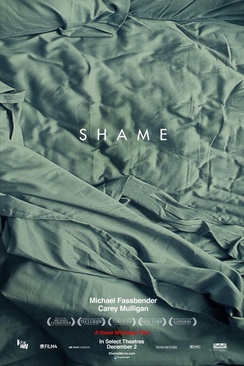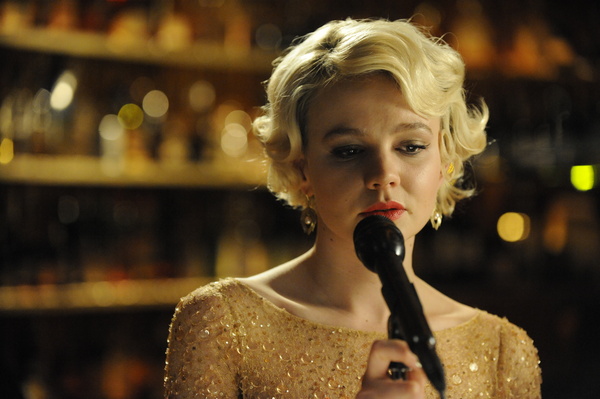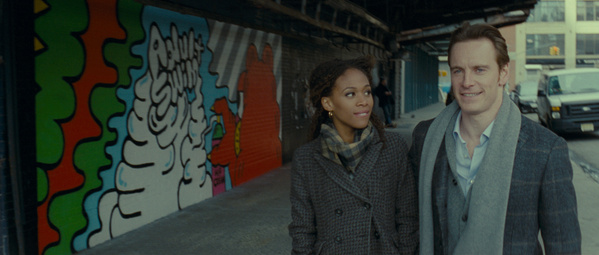Project 52: 'Shame'
Posted Wednesday, June 19, 2013 at 4:09 PM Central
Last updated Wednesday, June 19, 2013 at 4:11 PM Central
by John Couture

I know that technically Shame falls just outside the parameters that I set for this little project, having been released in December of 2011, but I saw this film this weekend and I have to write about it. Besides, what good is having rules if you can't bend them from time to time?
Speaking of bending the rules, this film is no stranger to the taboo. It is the first NC-17 rated film to be included in the project (and probably only since no film released in 2012 got an NC-17).
The rating itself is a good jumping off point to a discussion of how our country views nudity as being the ultimate offense a film can make. You can kill thousands of people, in the case of The Sum of All Fears 2,922 casualties, and still get a PG-13, but one exposed nipple and you're on the fast lane to a "Hard R."
The hypocrisy of the MPAA is something that we've touched on before and it really deserves its own story, but it is really hard to talk about Shame without at least acknowledging the elephant in the room. All of that said, the film encourages you to think about lasciviousness and how our prudish nature might, in fact, be causing more harm than good.
Shame
If female nudity is look down upon with disdain by the MPAA, then male nudity is outright taboo in their eyes. Still, several films have featured male nudity and gotten an R rating, namely The Full Monty and The Crying Game. The problem with handcuffing Shame with the most restrictive rating is that it sends a particular message about the film that I just really didn't agree with.

Shame was rated NC-17 for some explicit sexual content. To me, that means either a graphic representation of intercourse of sex mixed with violence. There is neither in Shame.
Don't get me wrong, there is plenty of sex and nudity, but nothing rises above the level of an R rating in my estimation. And yet, this same myopic viewpoint is sort of what the film is trying to rally against, so I suppose it has that going for it.
Michael Fassbender is the consummate New Yorker complete with a swanky apartment and high-paying advertising job. He also has a sex addiction that he is losing control over when his life starts to spiral out of control.

Carey Mulligan plays his somewhat estranged sister who is a singer and wants to crash on his couch because she has a few gigs in the city lined up. The family dynamic between these two seems to play a big part both in his sexual addiction and her emotional dependency. The film only spends a small amount of time exploring this though and prefers to let the audience connect the dots, which makes me happy.
Instead, the film focuses on jarring images of male nudity that shock American audiences, but routinely show up in TV commercials over in Europe. These images along with the copious sexual acts are there to remind us that just because we gloss over the surface with a paint brush of prudishness, we are truly surrounded by "perversion" every day.
The film wants the audience to feel uncomfortable which is why many of the scenes between Fassbender and Mulligan are filmed in such a claustrophobic way. In many of them, they are literally inches apart. I know that they are family, but this closeness almost suggests a history of incest that is sort of always bubbling at the edges but is never realized in the film.

In fact, there's a scene in which Mulligan's character has just had sex with Fassbender's married boss in Fassbender's own bed and afterward, she crawls into bed with Fassbender before he rather vehemently tells her to get out of his bed. Now, I don't think Mulligan's character was looking to reignite any doused flames of incest from their childhood, but rather seeking the comfort of being held by a loved one, something that she is unable to get from her sexual partners.
Now, that's not to say that there wasn't some sort of relationship between the siblings or that said relationship isn't the driving force behind their intimate issues as adults. It's simply not expressed in adulthood which could be exasperating the problem. What is clear is that this film is just as much about familial relationships as much as it about seeing male genitalia.
Fassbender's character continually chooses his sex addiction over his sister and that winds up almost costing him his sister, literally. His sister's latest suicide attempt seems like it will be the catalyst to recovery for him, but the movie ends on an ambiguous note.

A woman on the subway that we first meet at the beginning of the movie when Fassbender's character flirts with her before she gets off the train and disappears. At the end of the film, she's more the aggressor this time in their flirtation and it seems that Fassbender's character has come to a literal crossroad in his life.
Much to my enjoyment, director Steve McQueen leaves the ending ambiguous by sharply fading to black. Personally, I think that Fassbender's character pursues the young woman, but not as a casual fling, but something more.
The answer is not for him to become a celibate monk, but to find a balance between family and his addiction. I'm optimist here and I think he is able to find it.

As a final aside, yes, everything you've read about Michael Fassbender's male endowment is true. Some guys really do have it all - in spades. Speaking of cards, much like Fassbender himself, I give this film a Full House.






